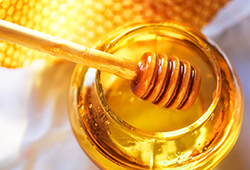Prevention
Many cases of botulism are preventable.
Foodborne botulism
Many cases of foodborne botulism have happened after people ate home-canned, preserved, or fermented foods that were contaminated with toxin. The foods might have become contaminated if they were not canned (processed) correctly.
Foods with low acid content are the most common sources of home-canning related botulism cases. Examples of low-acid foods are:
- Asparagus
- Green beans
- Beets
- Corn
- Potatoes
New sources of foodborne botulism continue to be identified. Contamination can happen when food is handled improperly when it is made, when it is stored, or when it is used by consumers. Some examples of foods that have been contaminated are:
- Chopped garlic in oil
- Canned cheese sauce
- Canned tomatoes
- Carrot juice
- Baked potatoes wrapped in foil
In Alaska, most cases of foodborne botulism are caused by fermented fish and other aquatic animals.
If you preserve, can, or ferment your own foods, you can reduce the chance of these foods giving you, your family, or friends botulism by:
- Following safe home canning instructions as recommended by the U.S. Department of Agriculture in the USDA Complete Guide to Home Canning
- Following all instructions for washing, cleaning, and sterilizing items used in canning
- Using pressure canners for low-acid foods like potatoes, most other vegetables, and meats
Everyone can reduce their chances of getting botulism by:
- Refrigerating homemade oils infused with garlic or herbs and throwing away any unused oils after 4 days.
- Keeping potatoes that have been baked while wrapped in aluminum foil hot (at temperatures above 140°F) until they are served, or refrigerating them with the foil loosened.
Wound Botulism
Prevent wound botulism by keeping wounds clean. If wounds appear infected, seek medical care quickly. A wound might be infected if it is:
- Red
- Swollen
- Painful
- Warm to the touch
- Full of pus or other drainage
- Accompanied by fever
Not all wounds with botulism show these general symptoms of a wound infection. If you have a wound and begin to have symptoms of botulism, seek medical care immediately.
People who inject illicit drugs, such as black tar heroin, are more likely to get wound botulism than people who do not inject drugs. People who get botulism from injecting illicit drugs might not have an obviously infected injection site. Learn more about preventing wound botulism caused by injecting drugs.
Wound botulism may happen after traumatic injuries, such as motorcycle crashes, and surgeries. Be alert to signs of infection.
Infant botulism

Most infant botulism cases cannot be prevented because the bacteria that causes the disease is in soil and dust. The bacteria can be found inside homes on floors, carpet, and countertops—even after cleaning. For almost all children and adults who are healthy, ingesting botulism spores is not dangerous and will not cause botulism (it’s the toxin that is dangerous). For reasons we do not understand, some infants get botulism when the spores get into their digestive tracts, grow, and produce the toxin.
Honey can contain the bacteria that causes infant botulism, so do not feed honey to children younger than 12 months. Honey is safe for people 1 year of age and older. Learn more about infant botulism from the Infant Botulism Treatment and Prevention Program.
Adult intestinal colonization
Adult intestinal colonization (also called adult intestinal toxemia) is a very rare type of botulism. People who have health conditions that change the structure or proper workings of their intestines (gut) may be at higher risk. Only a handful of people have been diagnosed with adult intestinal toxemia, and scientists do not fully understand how a person gets this type of botulism. It may be similar to infant botulism, which cannot be prevented.
Iatrogenic botulism
You can prevent iatrogenic (an illness caused by medical examination or treatment) botulism by getting injections of botulinum toxin only by licensed practitioners:
- If you need an injection of botulinum toxin for a medical condition, your doctor will choose the safest dose.
- If you get an injection of botulinum toxin for cosmetic reasons, be sure to go to a licensed professional.
- Page last reviewed: May 8, 2017
- Page last updated: July 26, 2017
- Content source:


 ShareCompartir
ShareCompartir
